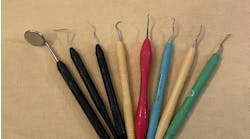Study finds excellent fit of restorations fabricated by E4D chairside system
Richardson, TX, January 2, 2013 – A recent study by faculty and students at the Medical University of South Carolina College of Dental Medicine found clinically acceptable marginal fits — regardless of the quality of the preparation — with restorations fabricated with the E4D System. There was a statistically significant correlation between the marginal fit and the quality of the preparation, however. Walter Renne, DMD, et.al, reported on the study, which investigated the impact of deviations from the ideal preparation, in The Journal of Prosthetic Dentistry (November 2012)*.
RELATED: CAD/CAM integration: a team sport
RELATED: 3M ESPE introduces Lava Ultimate CAD/CAM restorative
RELATED: D4D DentaLogic 2.0
The investigators used preparations placed in three categories (excellent, fair, or poor) and fabricated 75 ceramic crowns with the E4D Dentist system (D4D Technologies, Richardson, TX). They then examined the marginal gap values for each category. The results showed that the presence or absence of common preparation errors was a predictor of the quality of marginal fit.
Citing previous studies, the investigators state that “most authors agree that marginal openings of less than 120 µm are in the range of clinical acceptability with regard to longevity.” They go on to report that the mean marginal gap of the E4D fabricated crowns was significantly better in all categories: 38.5 µm for the excellent preparations, 58.3 µm for the fair preparations, and 90.1 µm for the poor preparations.
“Dr. Renne and his group have done a wonderful job of tying in the quality of the preparation to the ultimate fit of the restoration, as well as confirming the potential quality of chairside restorations produced with the E4D Dentist system,” said Gary Severance, DDS, Chief Marketing Officer of D4D Technologies. “Dental professionals using the E4D System (scan, design, mill) can be assured that they have a system that can produce great fitting restorations for their patients but at the same time know that the fundamentals of quality dentistry still prevail – better preparations lead to better restorations.”
Dr. Severance added, “We continue to support the training and continuing education of dental students and professionals through our own educational programs at E4D University as well as with our leading edge E4D Compare adaptive learning technology that enables dental students and faculty to compare students’ preparations to the school’s ideal standard for learning and evaluation. Our initiatives along with those of the dental education community, such as this study that illuminates the importance of preparation design, make us confident that modern technology will empower informed dental professionals to achieve even higher standards of restorative care in the future.”
*The complete article, “Predicting Marginal Fit of CAD/CAM Crowns Based on the Presence or Absence of Common Preparation Errors,” by Walter Renne, DMD, Samuel T. McGill, DMD, Kaitlyn VanSickle Forshee, Michael R. DeFee, and Anthony S. Mennito, DMD, can be found in The Journal of Prosthetic Dentistry 2012;108:310-315.






